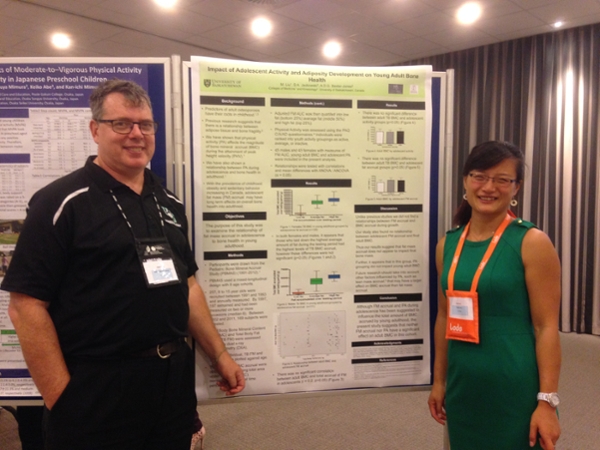
CoM student earns international award
Maple Liu won second place in the Young Researcher Award at the Pediatric Work Physiology Conference
By Marg SheridanStarted as a Summer Dean’s Project in 2014, Maple Liu’s research into the correlation between childhood fat-mass and bone health in adults culminated in international recognition this past September.
Liu, who started her research between first- and second-year, recently attended the Pediatric Work Physiology Conference in Ultrecht, Netherlands where she won second place in the Young Researcher Award for her poster presentation.
“It was really surprising,” Liu said. “It was an international conference and I was running against many PhD and Graduate students, so it was a huge honour really.”
Her research, done with Dr. Adam Baxter-Jones, an internationally renowned University of Saskatchewan kinesiology professor known for his research in children’s growth and development, looked at whether fat-mass in children could affect their bone mineral accrual and bone health as adults.
“We thought that fat mass would have a negative effect on bone health into adulthood,” explained Liu. “Although research has shown that many of the regulatory molecules produced by fat tissue have detrimental effects on bone, fat mass has also shown positive effects on bone strength.
“Fat tissue secretes many things, inflammatory markers and hormones especially. These molecules are sometimes bad for the bone, so the more fat you have, the lower your bone health. But at the same time, the more fat-mass you have, the heavier you are and it’s like weight-lifting for your bones."
Her work focused on fat-mass accrual in childhood up to peak-height-velocity - the point where they’re growing their fastest - and later compared it to cross-sections of adult bone scans to compare results. Analysis of the data showed that a higher fat-mass in childhood didn’t affect bone health in adults tested in their 30’s. Instead, the study raised the question of whether lean-mass in childhood may have more of an impact.
“We do have data on that, but it hasn’t be formally analyzed – at least I haven’t analyzed it,” Liu stressed. “But it would be interesting to see if lean-mass accrual in childhood will be significantly beneficial to bone mineral density in adulthood.”
Another thing her research has shown is that Liu believes she’s found a calling in pediatrics.
“I’ve been learning so much about the research that’s involved and how much good upstream medicine and research into childhood can affect outcomes in adulthood,” she explained. “We know that childhood diabetes, and a lot of the markers that guide where your adulthood health goes, come from (childhood). So I think that’s a very important area to focus our healthcare.”
